45 Manager feedback survey questions you should be asking your employees

Let’s imagine a person named Sarah, a talented and ambitious manager who has just been promoted to lead her team to new heights. Excited about her new role, Sarah was eager to prove herself as an effective leader and inspire her team to achieve their goals.
She had read countless books and attended numerous seminars on management, but she knew that true leadership was more than just theory. She understood that she needed to connect with her team, understand their needs, and continuously improve her managerial practices.
As Sarah started her new role, she realized that leading a team was far more challenging than anticipated. She struggled to balance her team's needs with hers, and communication often fell short, leading to misunderstandings and frustration.
Sarah knew that to become an effective manager, she needed to gather employee feedback and understand how they perceived her leadership style.
This is where a feedback survey comes in. It's a well-designed set of questions that can provide valuable insights into a manager's strengths and areas for improvement. By asking the right questions, Sarah could identify where she excelled and where she needed to focus her efforts to become a more effective leader and manager.
Let’s talk about the importance of manager feedback survey questions you should ask in 2023 to excel as a leader. These questions will help you understand how employees feel about you and get actionable feedback.
See how manager feedback survey would look like in CultureMonkey's employee survey tool.
Blog Highlights


- Managerial skills for effective leadership
- How to craft a manager effectiveness survey template?
- What kind of questions should I ask for feedback on leadership?
- 45 Leadership survey questionnaire for employees to get feedback on their managers
- Benefits of a manager effectiveness survey with CultureMonkey
How to become an effective manager to drive positive change in the team?

Effective communication is key to successful leadership. As a manager, you must proactively convey your expectations, goals, and vision to your team. You also need to encourage your employees to be open and honest about any feedback or ideas they have. Such a culture fosters trust, which is the foundation of a great team.
Now, one might ask, what’s the single most important trait of an effective manager? It is to lead by example. One needs to set a standard for their team by demonstrating the behavior they want to see. If a manager is honest, takes accountability, and commands respect, the team members will look up to them and follow in the same footsteps.
An effective manager should have performance expectations but, at the same time, create a trusting and open environment that lets others speak up and boosts productivity and morale. They must also provide their team with timely constructive feedback on their performance, highlighting their strengths and identifying areas for improvement.
But all these leadership skills and qualities cannot be nurtured in a single day. So, you should always keep learning by seeking out training, attending conferences, reading books, and staying up-to-date on the latest trends and best practices in management.
By continuously improving your skills and knowledge, you will become an effective leader and manager, drive positive change in your team and improve the employee experience.



It’s important to have a feedback loop, where you’re constantly thinking about what you’ve done and how you could be doing better.
CEO
Tesla Motors and SpaceX
What is the purpose of the manager feedback survey?

An employee engagement survey aims to gather timely feedback from team members on the performance of managers, their leadership style, communication skills, and overall effectiveness in their roles. Taking regular constructive feedback is essential for identifying areas of strength and weakness that can help drive improvements in team engagement and leadership.
The manager survey can provide valuable insights into how team members perceive their performance and highlight areas where they excel and areas where they could improve. By gathering feedback, managers can identify blind spots in their leadership practices and implement strategies to improve communication, delegation, decision-making, and other essential skills.
It also helps in improving employee satisfaction as the team members' opinions are taken into consideration. Most importantly, it shows that the manager cares about getting better, improving the overall management effectiveness.
The feedback survey is also an opportunity for team members to share new ideas, concerns, and suggestions for improvement. It promotes a company culture of open communication and transparency and can help strengthen the relationship between managers and their teams through employee engagement.
The overall purpose of feedback and employee surveys is to help managers become more effective leaders, consistently make effective decisions, drive positive change in their teams, and boost employee engagement by identifying areas for improvement and implementing strategies to address them.
Managerial skills for effective leadership
Managerial skills are crucial for leaders to effectively guide their teams and drive organizational success. A skilled manager can balance complex responsibilities while ensuring team cohesion and productivity. Here are key skills every manager should cultivate for effective leadership:
- Emotional intelligence (EQ): Managers with high EQ are attuned to their emotions and those of others. They excel at empathy, self-regulation, and social awareness, which fosters trust, resolves conflicts, and maintains team morale.
- Delegation: Effective managers know how to delegate tasks, empowering employees while optimizing team performance. Delegation ensures workloads are balanced, skills are utilized, and employees feel trusted.
- Adaptability: Modern workplaces are dynamic, and managers must quickly adapt to changes, whether they involve new technologies, shifting goals, or unexpected challenges. Adaptability helps maintain stability and resilience by enabling managers to respond effectively
- Strategic thinking: Successful managers see the bigger picture and make decisions that align with long-term organizational goals. Strategic thinking ensures proactive decision-making and forward-focused planning.
- Coaching and development: Beyond mentorship, managers need to actively coach employees, helping them identify strengths, address areas for improvement, and build new skills. This approach boosts engagement and long-term growth.
- Time management: Managers must efficiently prioritize their tasks and those of their team, avoiding burnout and maximizing productivity. Effective time management ensures that goals are met within deadlines without sacrificing quality.
- Crisis management: Navigating crises calmly and decisively is a hallmark of effective managers. From unexpected operational challenges to interpersonal disputes, skilled crisis management minimizes disruptions and maintains cohesion.
Manager feedback surveys vs 360-degree reviews

| Aspect | Manager feedback surveys | 360-degree reviews |
|---|---|---|
| Focus | Primarily centered on evaluating and enhancing manager effectiveness, often based on employee feedback. | Comprehensive feedback for an individual from multiple sources: peers, subordinates, supervisors, and even clients. |
| Feedback sources | Typically involves feedback from employees directly reporting to the manager. | Involves input from a broader range of individuals, creating a holistic view of performance. |
| Purpose | Aimed at gathering insights on a manager's leadership, communication, and managerial skills to drive engagement and improvement. | Designed to provide a well-rounded assessment of an individual's performance, behaviors, and competencies from various perspectives. |
| Frequency | Often conducted regularly (quarterly or biannually) to assess and track manager progress. | Usually conducted on an annual basis as part of a formal performance review process. |
| Anonymity level | Typically focuses on ensuring anonymity for honest and candid employee feedback. | Offers anonymity for participants, but the feedback is often aggregated across groups. |
| Action plan | Results drive specific development plans for managers to enhance their effectiveness. | Results may influence broader professional development, role assessments, and career planning for the individual. |
How to craft a manager effectiveness survey template?
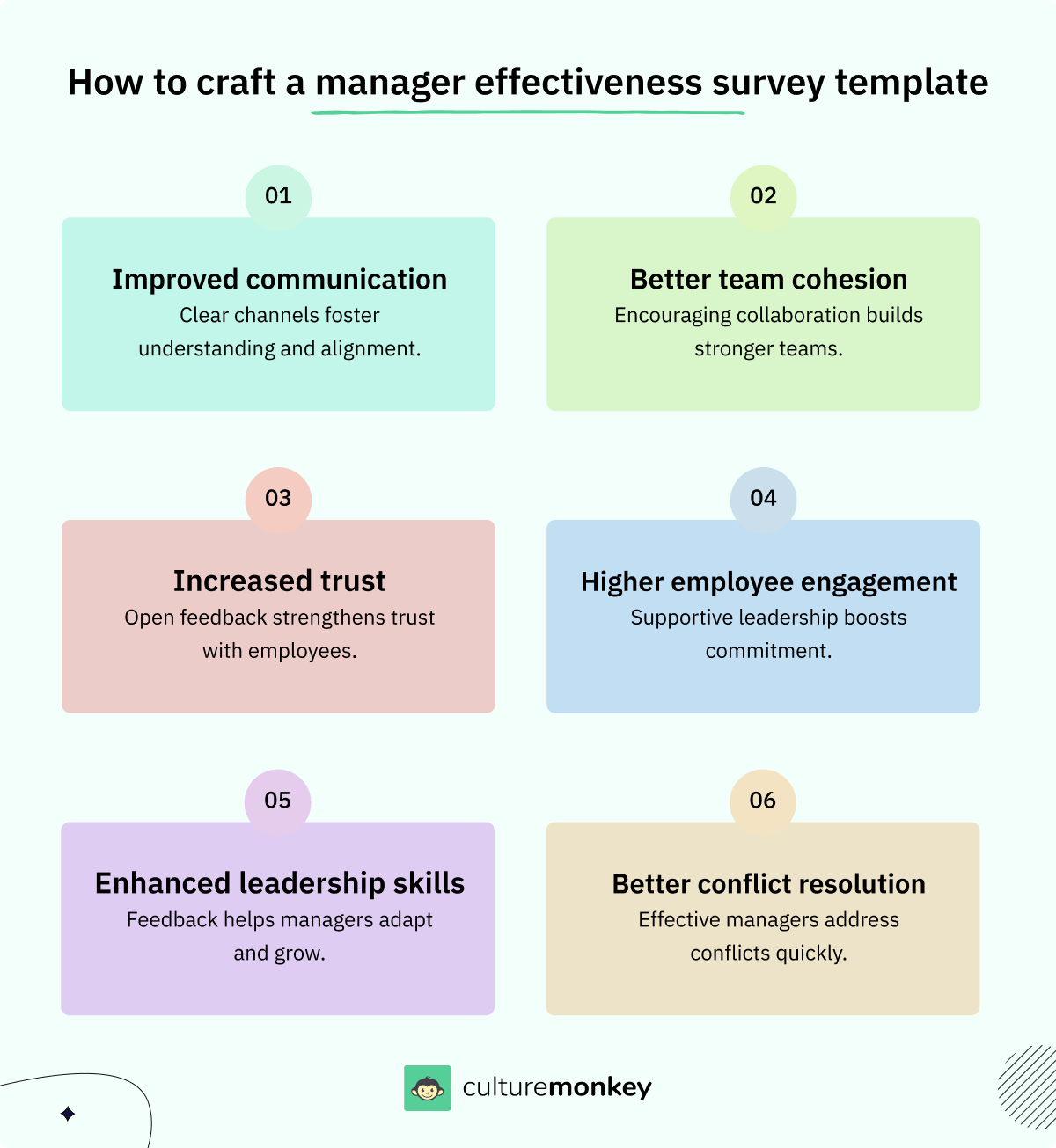
Crafting a manager effectiveness survey template requires careful consideration of the questions you want to ask and the information you want to gather. Here are the steps to follow to create a manager effectiveness survey template.
1. Define the purpose
Start by defining the purpose of the survey. What do you want to achieve by gathering feedback on your manager's effectiveness? What are your goals and objectives? This will help you create a clear and focused survey template.
2. Identify the Categories
Identify the categories you want to assess manager performance in, such as communication, leadership, performance management, work environment, and teamwork. Categorizing the questions will help you focus on specific areas of the manager's performance.
3. Draft the questions
Curate the questions for each category. Be specific and clear, and avoid ambiguous or leading questions. Use a mix of closed-ended and open-ended questions to gather quantitative and qualitative data.
4. Consider the format
Choose whether the survey format will be online, paper, or in-person. Select a format that is easy to use and accessible to all team members.
5. Review and test
Analyze the survey questions for clarity, relevance, and completeness. Test the sample survey questions with a small group of team members to identify any issues or areas for improvement.
6. Finalize the template
Finalize the employee survey questions template based on the feedback you received and your testing results. Ensure that the questions align with the purpose of the survey and that they will provide the information you need to assess your manager's effectiveness.
7. Administer the employee feedback survey
Administer the survey to your team members and collect the responses. Analyze the data and use the engagement insights to identify areas for improvement and develop an actionable feedback plan to address them.
Pitfalls to avoid when creating manager feedback surveys

Creating effective manager feedback questions is crucial for gathering actionable insights and driving meaningful change. However, several common pitfalls can undermine the survey's value and reduce participation. Here are key mistakes to avoid:
- Overly long surveys: Lengthy surveys can lead to fatigue and incomplete responses. Aim for brevity while ensuring all critical topics are covered. Focus on concise, targeted questions to maximize response rates.
- Ambiguous questions: Vague or poorly worded questions confuse respondents, leading to inaccurate data. Use specific, clear language to ensure that feedback is relevant and useful.
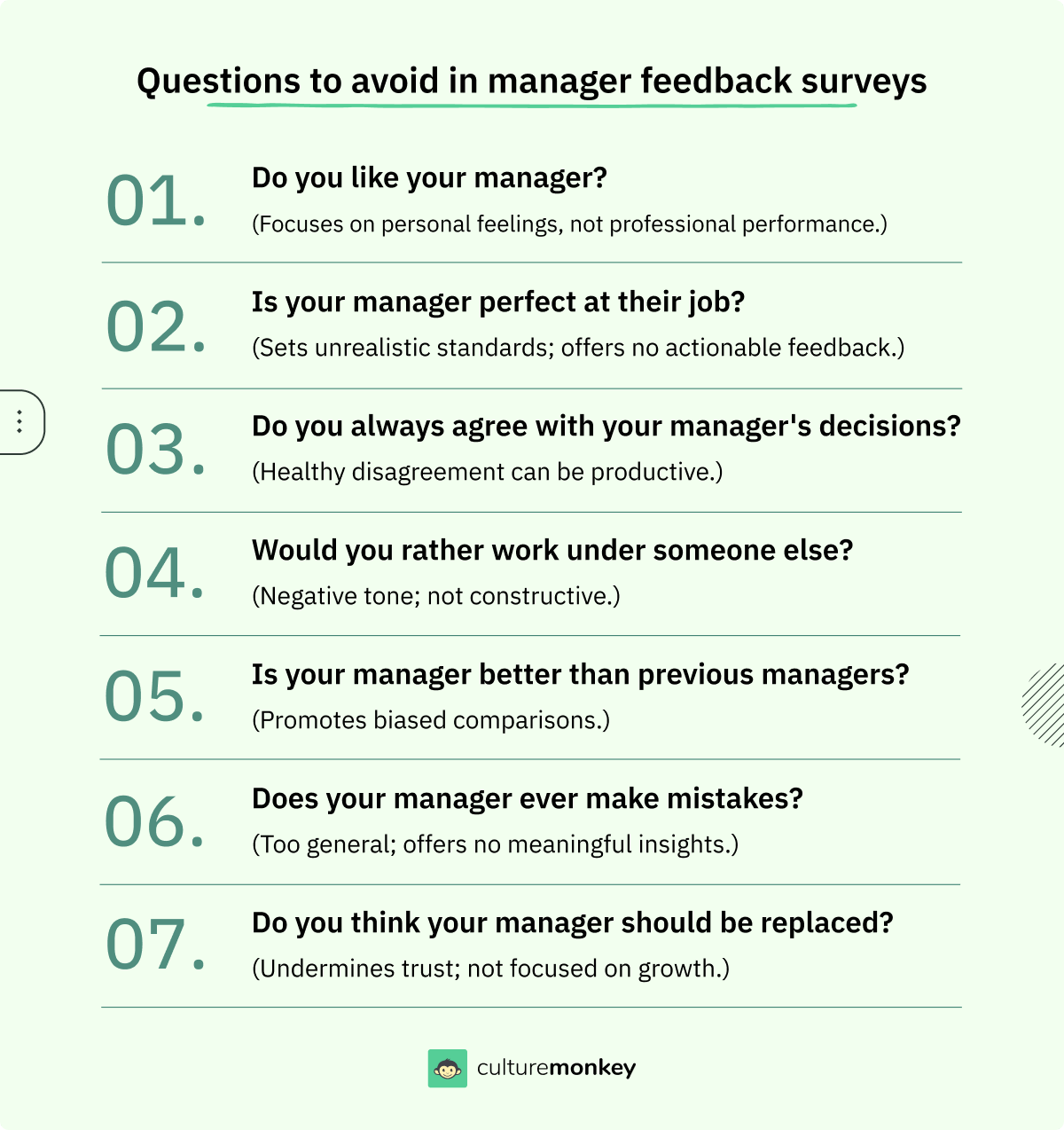
- Failing to offer anonymity: Employees may hesitate to share honest feedback if they fear repercussions. Ensure anonymity to foster candid responses and promote trust within the organization.
- One-size-fits-all approach: Different teams have unique needs, and a generic survey may not capture meaningful insights. Tailor questions based on the team’s context, manager’s role, or specific organizational goals.
- Lack of action on feedback: Collecting feedback without implementing changes can lead to disengagement and frustration. Ensure a clear plan for acting on feedback and communicate progress to employees.
- Infrequent surveys: Conducting surveys too infrequently can cause data to become outdated and irrelevant. Regularly gather feedback to stay attuned to evolving employee needs.
- Bias in question design: Leading or biased questions can skew results and reduce the validity of the feedback. Strive for neutrality to capture genuine employee perceptions.
What kind of questions should I ask for feedback on leadership?

Leadership is a tough nut to crack, especially because it has so many dimensions. However, the most important aspect of a leader is caring about the well being of your employees and being the one everyone looks up to.
So, when the management team is designing a survey for honest employee feedback on leadership, they must ask a different range of questions. Some might be simple ‘yes’ or ‘no’ ones, while others could be descriptive to get an overall picture of the manager's performance.
Having a wide range of could help get a better perspective on the manager's leadership style and easily pinpoint areas of improvement. Let’s look at the type of survey questions that should be present in a leadership feedback form.

Shape the leaders of tomorrow.
Our guide offers targeted questions to evaluate manager effectiveness and team engagement, fostering growth and success.
Open-ended questions
These questions allow team members to share their thoughts and experiences in their own words. Examples include "How would you describe your manager's leadership style?" and "What are some areas where your manager could improve their leadership skills?"
Closed-ended questions
These questions are useful for gathering quantitative data and providing clear and straightforward answers. Examples include "On a scale of 1 to 10, how effective is your manager's communication with the team?" and "Does your manager involve the whole team fairly in setting objectives and developing strategies? Yes/No." Being objective, these type of answer makes it easy to rank the manager based on their leadership qualities and abilities.
Likert scale questions
These questions ask respondents to rate their agreement or disagreement with a statement on a scale, usually ranging from "strongly agree" to "strongly disagree." For example, "My former manager cares, values and encourages open communication within the team" and "My manager recognizes and rewards good performance."
Behavioral questions
These questions ask team members to provide examples of how their manager worked or has handled specific situations in the past. Examples include "Can you describe a time when your manager successfully resolved a conflict within the team?" and "How has your manager supported your professional growth and professional development throughout?"
The employee survey questions should be balanced and have a proper mix of all these questions. If there are too many open-ended questions, the depth might not be enough for proper assessment. On the other hand, if there are too many descriptive ones, it will become too cumbersome for many employees to fill because of the length.
45 Leadership survey questionnaire for employees to get feedback on their managers
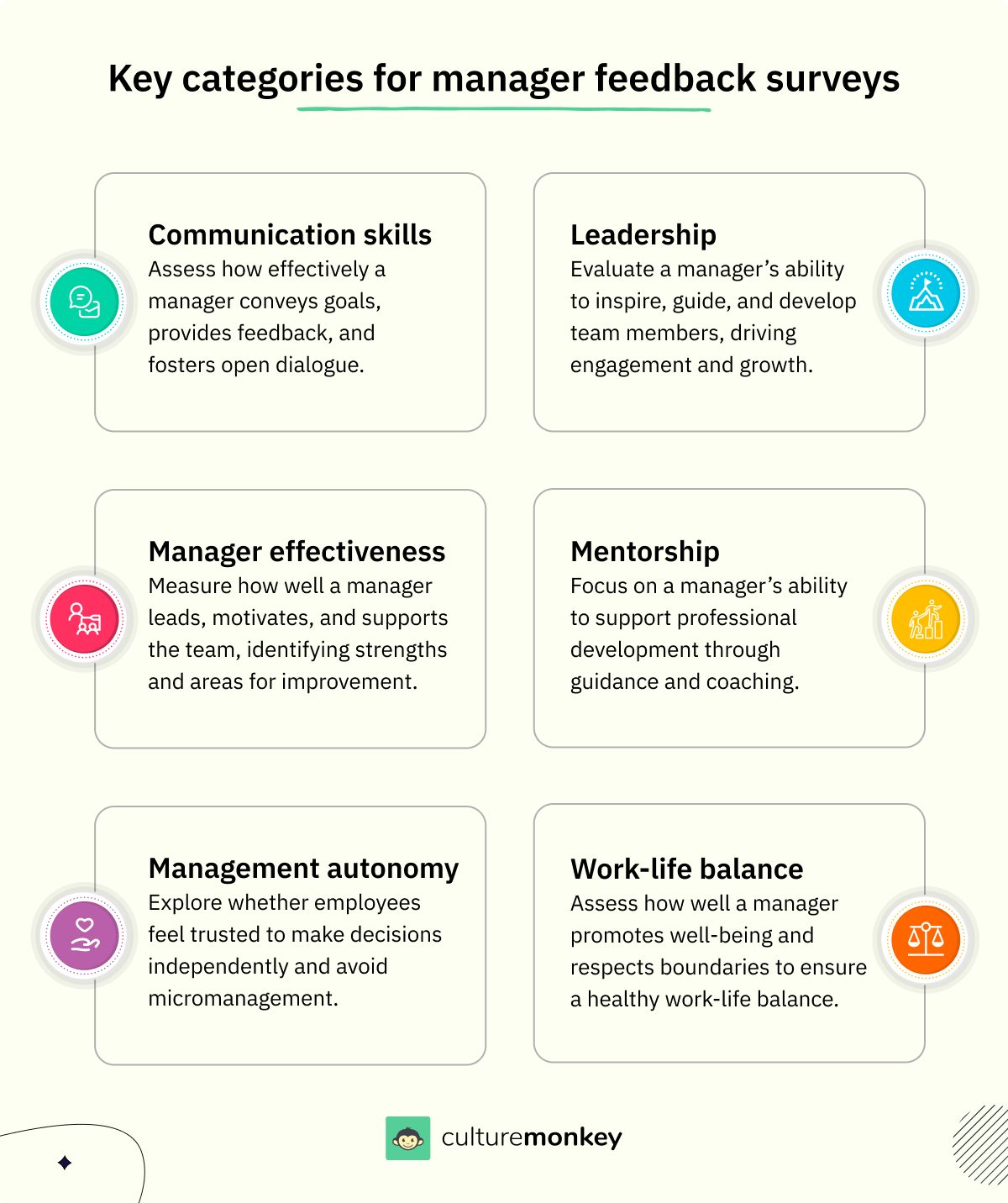
Measuring feedback about managers is always a tricky thing as at times employees don’t fee comfortable giving negative feedback about their managers because of the fear of anonymity.
Thus, we've compiled 45 leadership anonymous survey questions to help organizations get employee feedback on their managers. These questions assess different aspects of leadership, such as communication, decision-making, management, mentorship, and work-life balance.
Organizations can use employee engagement survey questions to gain valuable insights into their managers' strengths and weaknesses and develop strategies to improve their leadership skills.
Questions about a manager’s communication skills
📢Effective communication is a crucial component of any successful workplace. Gallup reports that organizations with effective communication practices are 4.5 times more likely to have high employee engagement.

The following feedback questions will help you answer how effectively you communicate with your team and point out overall areas of improvement.
- Does your manager communicate performance expectations clearly?
- How would you rate your manager's ability to communicate effectively with the team?
- Is your manager responsive to your queries even while not working from the office?
- Does your manager provide regular opportunities for team members to give feedback?
- How often does your manager hold team meetings to discuss goals, progress, and challenges?
- Does your manager actively listen and seek to understand your perspective during discussions?
- How effective is your manager at providing constructive feedback without creating a negative environment?
Questions about manager effectiveness
🔑Managers play a key and vital role in the success of any organization, and their effectiveness can significantly impact the team's overall performance. Gallup reports that companies with effective managers have 48% higher profits.

Highly effective managers often boost employee productivity, increase morale and create an open workplace culture.
- Can you describe the overall work environment created by your manager? Is it positive, negative, or neutral? Why?
- Does your manager effectively solve problems and difficult situations effectively?
- Rate your manager from 1 to 10 in terms of encouraging creativity and innovation
- Does your manager take a proactive approach to problem-solving and is able to sort out difficult situations?
- How effectively does your manager motivate and inspire the team to reach goals?
- Does your manager promote a positive and inclusive work culture?
- How often does your manager acknowledge and appreciate team accomplishments?
Questions about autonomy from management
🚀Giving employees autonomy can be a powerful way to promote and increase employee engagement and productivity. It helps your employees feel valued, gain control over their work and be accountable for their responsibilities.
At the same time, by avoiding micromanagement, managers can reduce to and fro and focus on more important tasks.
- Do you feel empowered to make decisions in your role without consulting with your manager constantly?
- Can you describe a time when you were encouraged to take on new challenges and pursue new organizational opportunities?
- Does your manager take direct reports on a regular basis?
- Do you clearly understand your job responsibilities and the authority you have to make decisions?
- How often does your manager give you the freedom to lead projects or initiatives?
- Does your manager foster a sense of accountability within the team?
- Do you feel trusted to handle key responsibilities without excessive oversight?
Questions about leadership
💪Strong leadership is essential for creating a positive and productive work environment. Great managers are also responsible for creating future leaders that will stay aligned with company values and help the organization grow in the future.
The following questions can help you gain insights into where you can improve your leadership skills.
- What specific actions could your manager take to improve their leadership skills?
- Does your manager treat you with respect and demonstrate integrity and ethical behavior?
- On a scale of 1-10, how effective is your manager at inspiring you to do your best work?
- Does your manager recognize your efforts?
- How well does your manager adapt to changing circumstances and challenges?
- Does your manager foster a sense of belonging within the team?
- How often does your manager discuss team or company goals and the impact of your work?
- Does your manager empower others to take on leadership roles when necessary?
Questions about mentorship
🌱Great managers also need to be excellent mentors. Employees want their manager to help them with career development opportunities and guide them along the right path.
- Does your manager care about your concerns and provide feedback?
- Can you describe a time when your mentor provided you with particularly helpful guidance or support?
- On a scale of 1-10, how effective is your mentor at helping you in career development and achieving your goals?
- What specific actions could your mentor take to improve their mentorship skills?
- How often does your mentor offer guidance on skill development and career growth?
- Does your mentor help you identify potential areas of improvement and growth opportunities?
- In what ways has your mentor supported your professional and personal development goals?
- Does your mentor encourage you to take on challenging assignments to build new skills?
Questions about work-life balance
⚖️Gallup reports that employees with a good work-life balance are 21% likelier to be engaged at work. So, as a manager, you must have a clear idea of whether you have been good at giving your employees a good balance between work, personal, and family life.
- Does your manager encourage a healthy work-life balance and takes care of your well being?
- What specific changes could be made to improve your work-life balance?
- Can you describe a time when your work-life balance was particularly good? What contributed to this?
- Does your manager respect boundaries and avoid contacting you during off-hours (unless truly necessary)?
- How often does your manager offer flexibility for personal obligations or emergencies?
- Does your manager lead by example when it comes to maintaining work-life balance?
- Does your manager support taking time off for mental health and well-being?
- Are you encouraged to disconnect from work during your days off?

Great leadership starts with feedback.
Get effective manager feedback survey questions designed to enhance team performance, foster growth, and build a more engaged, collaborative workplace.
What should organizations do with the results of manager feedback surveys?

Manager feedback questionnaire can provide valuable insights for improving managerial performance and workplace culture. However, it is critical for organizations to use the results effectively to drive real change. Here are actionable steps to take after gathering feedback:
- Communicate results transparently: Share aggregated results with managers and employees to foster trust and demonstrate a commitment to improvement. Transparency shows employees that their feedback is valued, taken seriously, and used to drive meaningful changes in the workplace.
- Identify key areas for improvement: Analyze the data to pinpoint patterns, strengths, and areas needing attention within the organization. By focusing on high-priority issues that impact employee engagement and productivity, you can develop targeted strategies for meaningful change.
- Set clear and measurable goals: Collaborate with managers to establish well-defined goals and metrics based on survey findings. Track and review progress toward these goals regularly to maintain accountability and ensure continuous improvement.
- Encourage two-way feedback: Create open channels for continuous feedback between managers and their teams, reinforcing a culture of mutual respect, learning, and collaboration. This process establishes an ongoing loop of feedback and development.
- Recognize and reward positive performance: Celebrate managers who have demonstrated growth, improvement, or excellence based on feedback results. Recognition and rewards not only motivate continued progress but also inspire other managers to reach similar goals.
- Reassess regularly: Conduct follow-up surveys to measure progress and make necessary adjustments to action plans. Regular evaluation ensures that changes remain relevant, effective, and aligned with evolving organizational needs.
Benefits of a manager effectiveness survey with CultureMonkey
Implementing a manager effectiveness survey through an employee engagement survey provider like CultureMonkey offers several key benefits:
- Heatmap visualization: CultureMonkey's heatmap visualization provides a clear, color-coded representation of survey data, highlighting areas where managers excel and where improvement is needed. This intuitive tool enables organizations to quickly identify trends and focus on specific aspects of managerial performance that require attention.
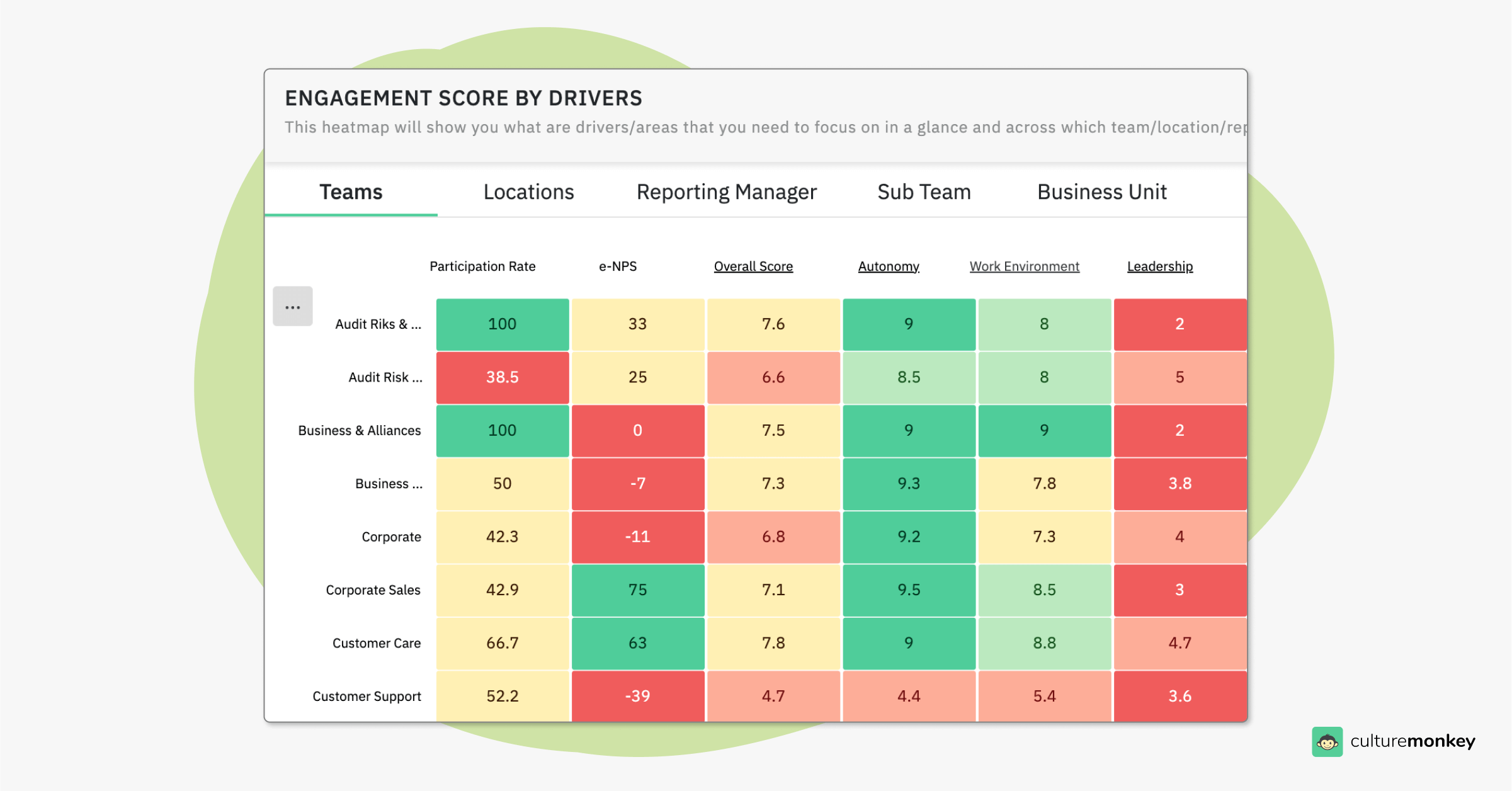
- Manager effectiveness survey templates: With CultureMonkey’s manager feedback surveys you can send relevant customized questions to your employees to gauge their leadership effectiveness, anonymously. This tailored approach generates actionable insights that helps you identify strengths and weaknesses of individual managers, to help you promote long-term growth for managers and foster effective leadership within teams.
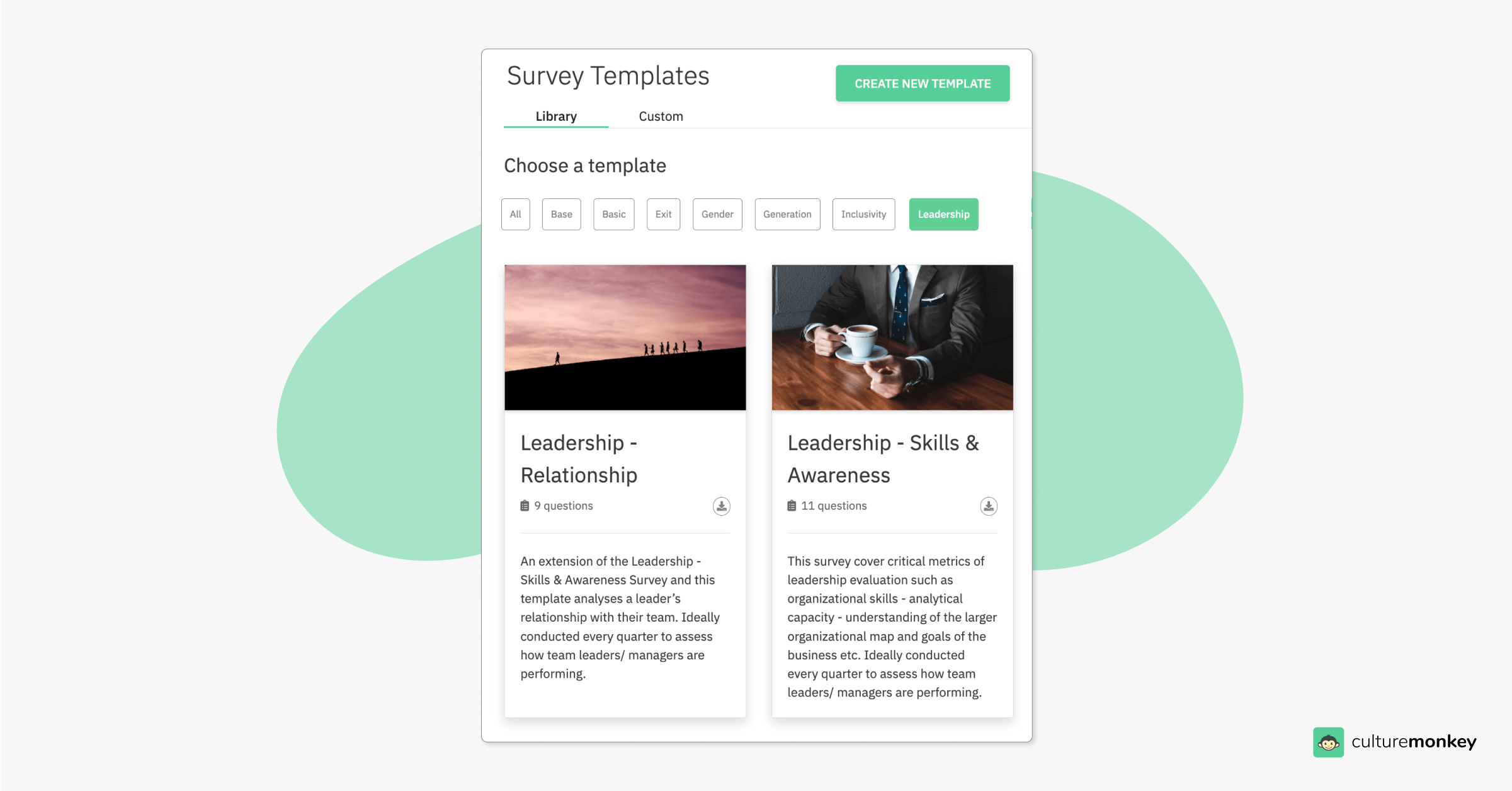
- Built-in Likert scale: The platform incorporates a built-in Likert scale, facilitating standardized responses that are easy to analyze. This feature allows employees to express their perceptions on a consistent scale, providing clear insights into managerial performance and areas for development.
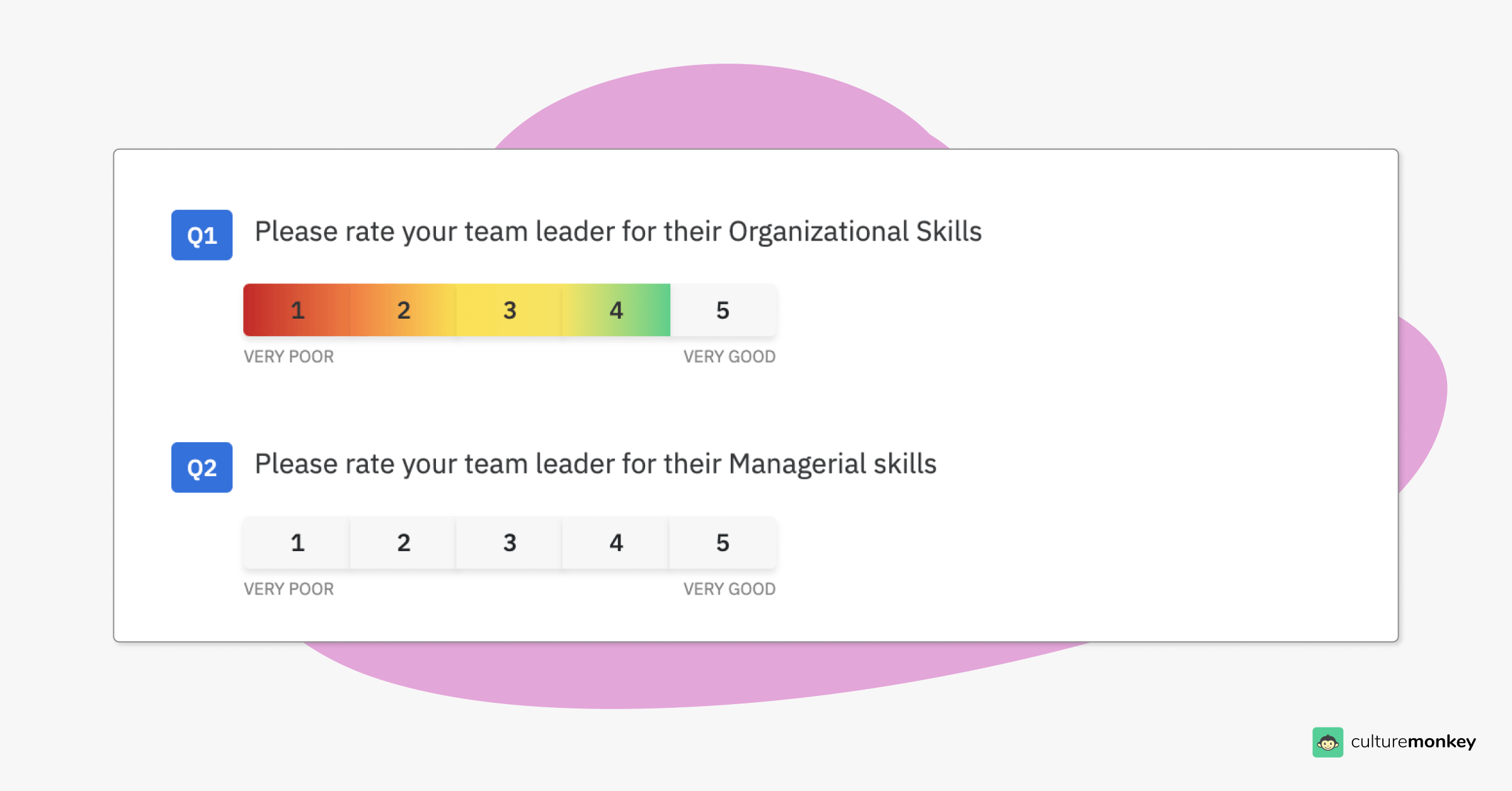
- Sentiment analysis tools: CultureMonkey's sentiment analysis tools delve into open-ended responses, identifying underlying emotions and attitudes. This advanced analysis helps organizations understand the nuances of employee feedback, uncovering deeper insights into managerial effectiveness.
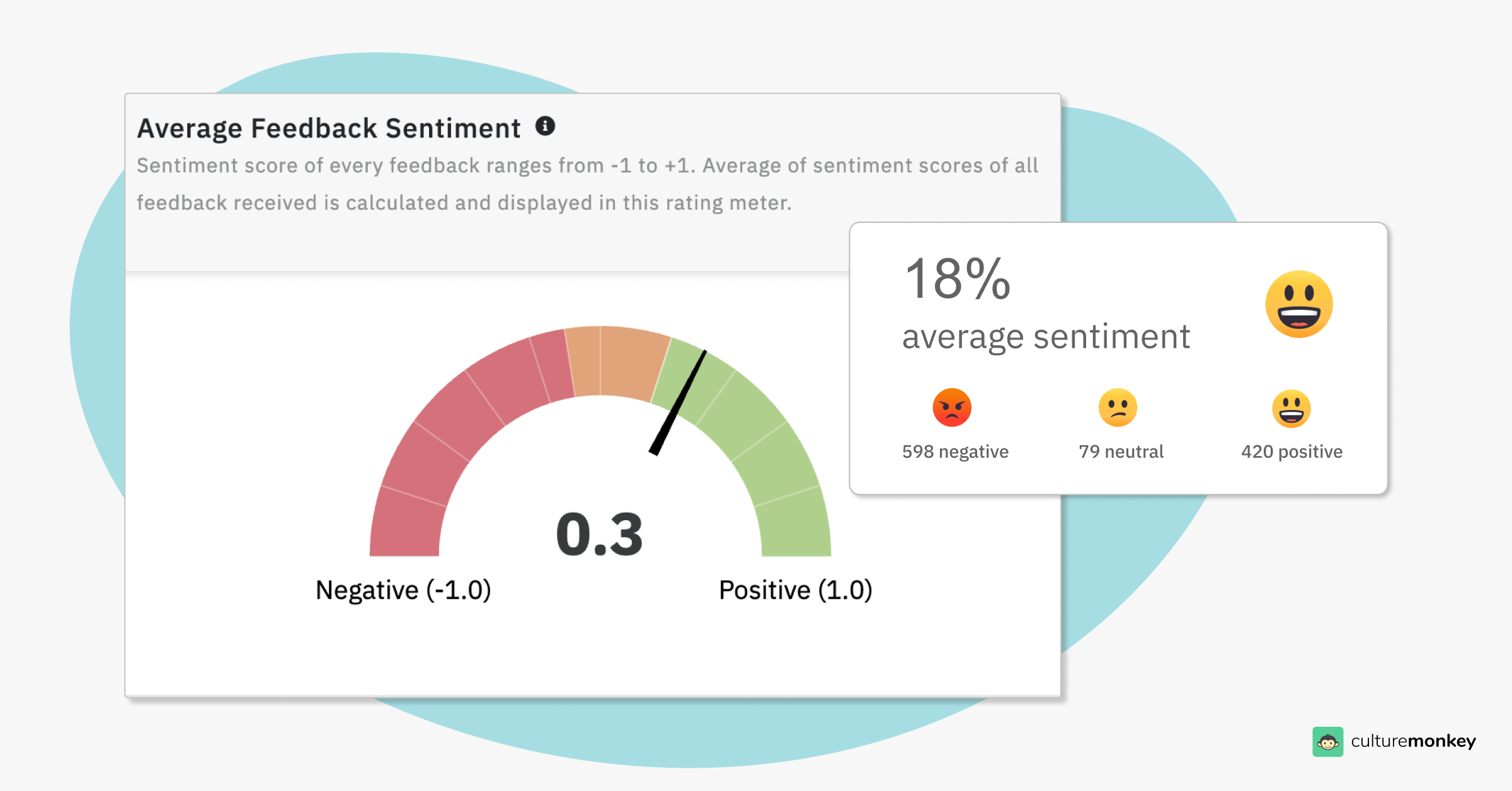
- Action planning features: Beyond data collection, CultureMonkey supports organizations in developing targeted action plans based on survey results. These features guide managers in implementing changes, fostering continuous improvement, and enhancing overall team performance.
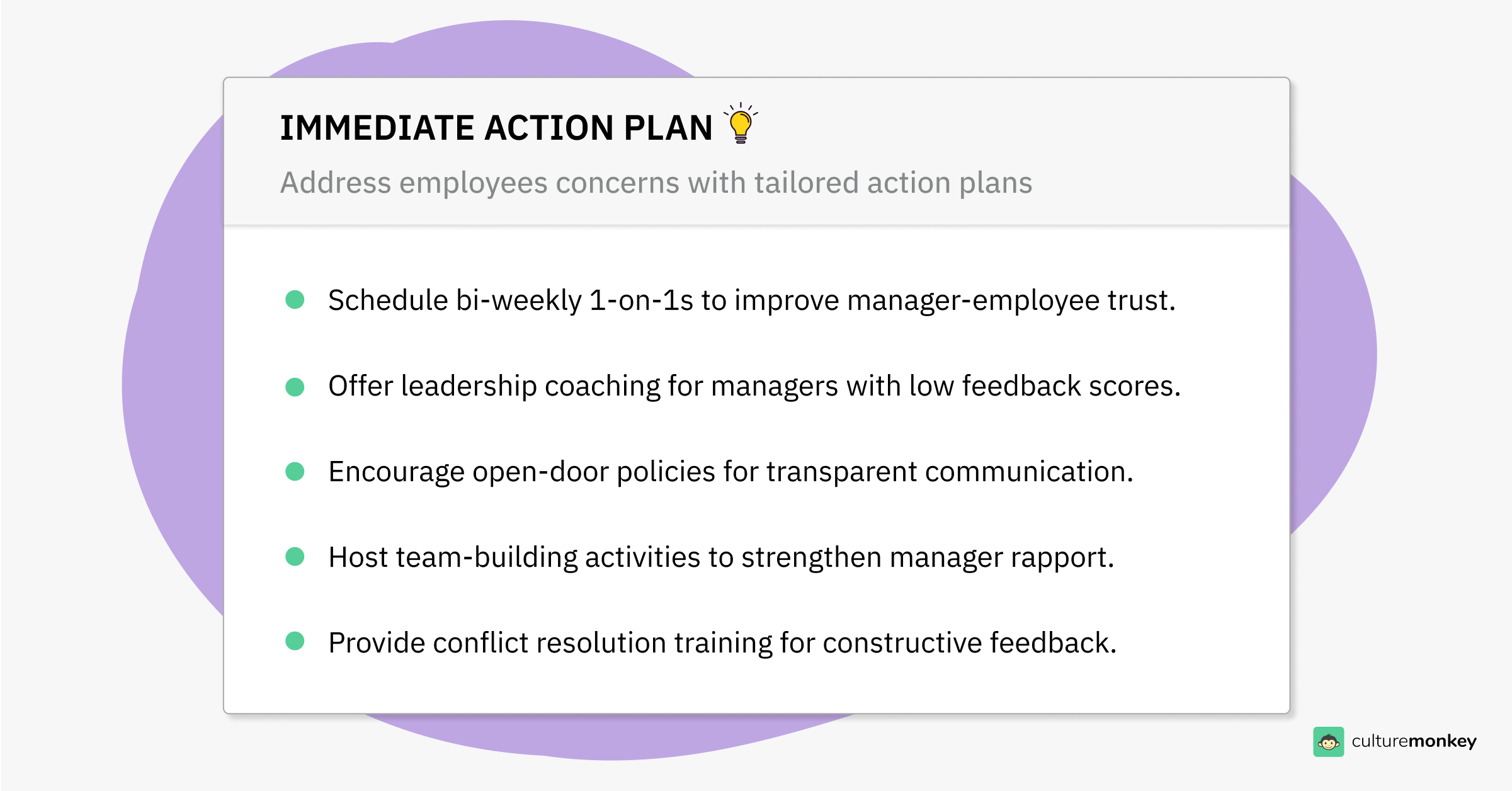
Conclusion
Creating effective manager feedback survey questions is crucial for fostering a motivated and high-performing workforce. Well-designed questions align with an organization’s values and unique goals, helping to build a workplace culture where employees feel heard and supported.
Manager feedback surveys are a tool for creating a culture of continuous improvement and open communication. They promote accountability and trust, strengthen the manager-employee relationship, and drive better outcomes for teams and the entire organization.
CultureMonkey empowers organizations by providing a comprehensive platform to measure, analyze, and enhance workplace culture. A manager effectiveness survey, helps gather critical feedback to improve managerial performance.
By focusing on feedback and manager effectiveness, you can foster trust, drive meaningful change, and maximize the potential of your workforce. Take the first step toward a more engaged and empowered workforce.
Summary
Managerial feedback surveys play a critical role in improving leadership effectiveness, fostering a more engaged and productive workforce. By collecting structured feedback on key areas like communication, decision-making, mentorship, and team support, these surveys provide actionable insights into managerial performance.
Tailored questions allow organizations to identify strengths, pinpoint areas for development, and create growth-focused development plans. Regularly implementing these surveys helps build a culture of transparency, trust, and continuous improvement, ultimately leading to stronger teams and better organizational outcomes. Empowering managers through consistent feedback benefits not just individual leaders but the entire company’s culture and success.
FAQs
1. How do you ask employees for feedback?
When seeking employee feedback, provide a specific set of questions that align with the topic being evaluated. For example, if assessing managerial communication, focus on questions about clarity, openness, and responsiveness. Make sure the feedback request is clear, concise, and relevant. Creating a safe and open environment where employees feel comfortable providing honest and constructive feedback ensures more meaningful and actionable responses.
2. How often should we ask for feedback on managers?
The frequency of feedback collection depends on organizational goals and culture. Annually or bi-annually is common for comprehensive evaluations, but more frequent touchpoints, such as quarterly check-ins, can quickly identify and resolve issues. Regular feedback cycles provide continuous opportunities for improvement, keeping managers attuned to employee needs and promoting a culture of accountability and growth.
3. How should we ensure anonymity in feedback surveys?
To guarantee anonymity, utilize secure survey tools like CultureMonkey, which protect employee identities and ensure confidential responses. Clearly communicate that feedback will remain anonymous, and emphasize that it cannot be traced back to individuals. Transparency about how feedback will be used and assurances of confidentiality help build trust, encouraging candid and honest participation from employees.
4. How can we encourage participation in employee engagement surveys?
Encouraging participation starts with ensuring anonymity and demonstrating that employee feedback leads to real changes. Create a culture where honest input is valued, respected, and acted upon. Clearly communicate the survey's purpose, its benefits, and how responses will drive improvements. Recognition and incentives for participation, along with transparent follow-ups, can further boost engagement and survey completion rates.
5. How can we ensure that feedback is constructive and not just criticism?
To ensure constructive feedback, design survey questions that focus on specific, actionable behaviors rather than vague criticisms. Encourage employees to provide a balanced view, including both positive feedback and areas for improvement. Ask for suggestions on how managers can improve. This approach shifts the conversation from complaints to solutions, fostering more effective growth and development for managers.
6. Why is it important to collect feedback on managers?
Collecting feedback on managers is crucial for identifying leadership strengths, addressing blind spots, and improving team dynamics. It gives employees a voice, builds trust, and fosters a culture of transparency. Manager feedback also helps organizations support leadership development, enhance employee engagement, and reduce turnover, since poor management is one of the most common reasons employees leave their roles.
7. How often should we run manager feedback surveys?
Manager feedback surveys should be conducted at least once or twice a year to ensure continuous improvement and early detection of leadership issues. Pairing formal surveys with periodic informal check-ins can provide a fuller picture. Consistent feedback cycles help track manager growth over time, foster accountability, and show employees that their input drives meaningful leadership development.
8. Should manager feedback surveys be anonymous?
Yes, manager feedback surveys should be anonymous to encourage honest and candid responses from employees. Anonymity creates a safe space where team members feel comfortable sharing genuine feedback without fear of retaliation. This leads to more accurate insights, helps identify areas for improvement, and builds a culture of trust, transparency, and continuous leadership development across the organization.




